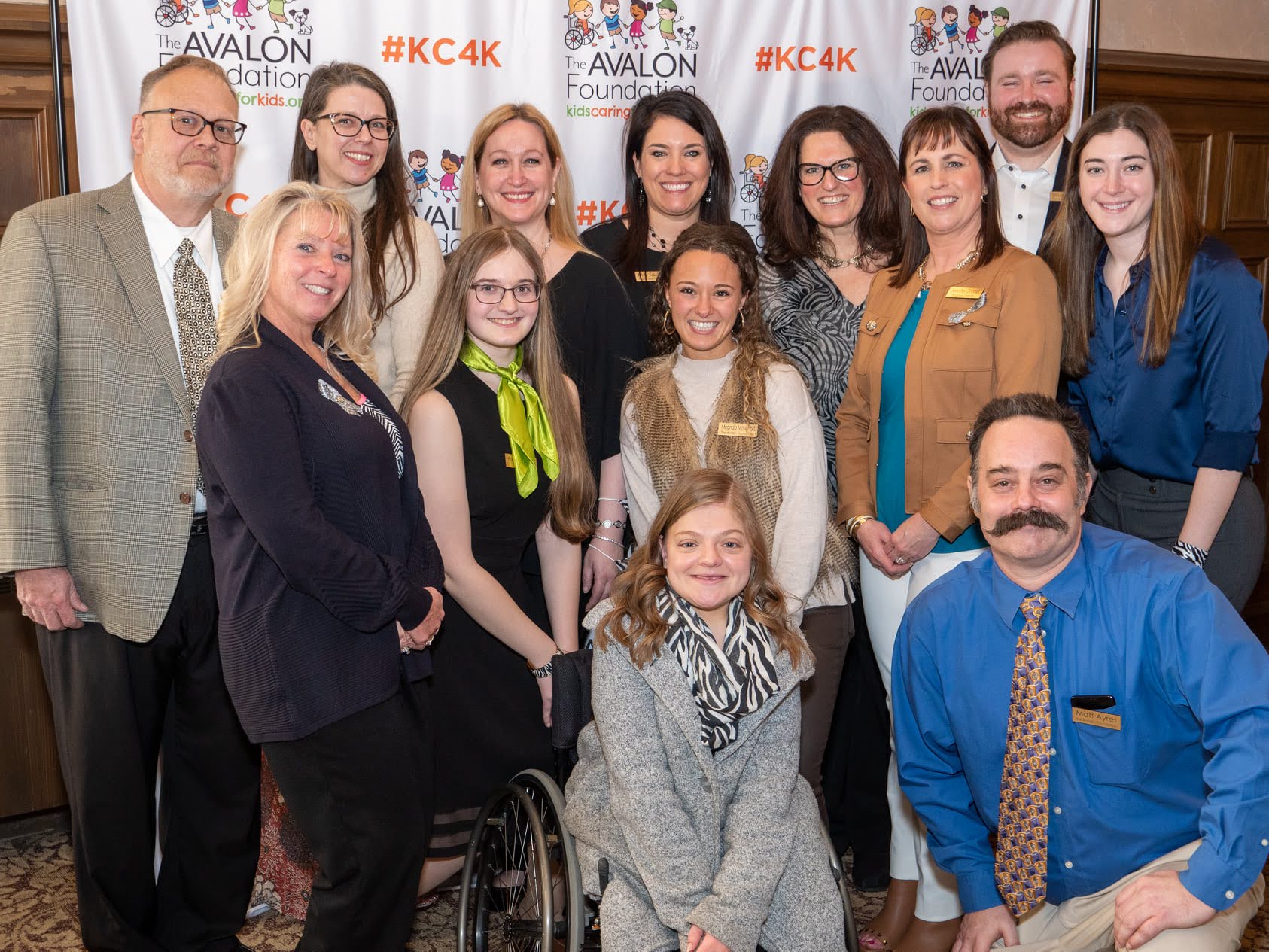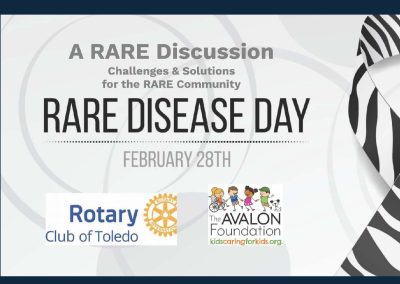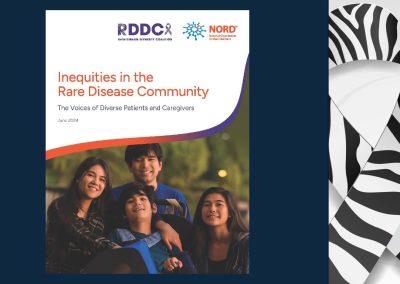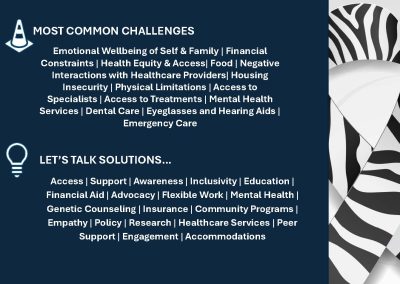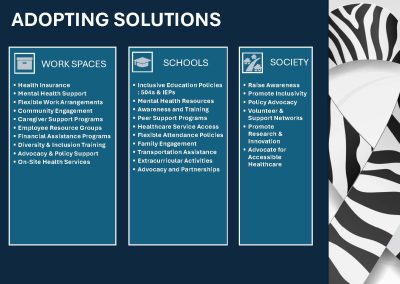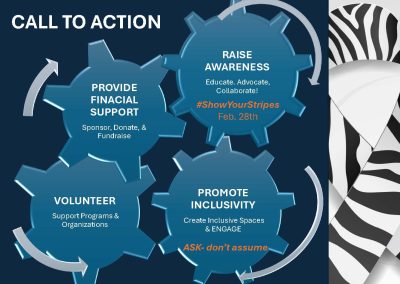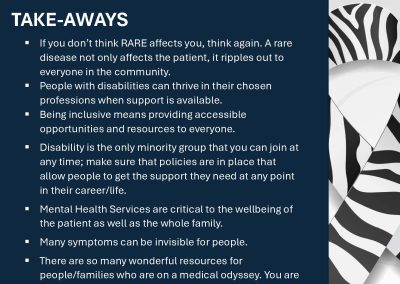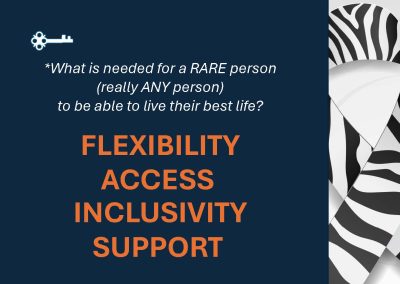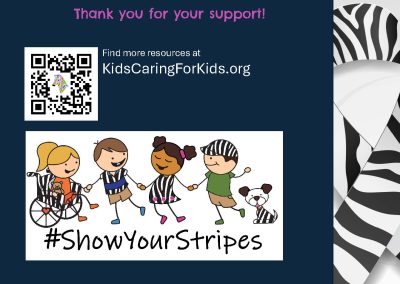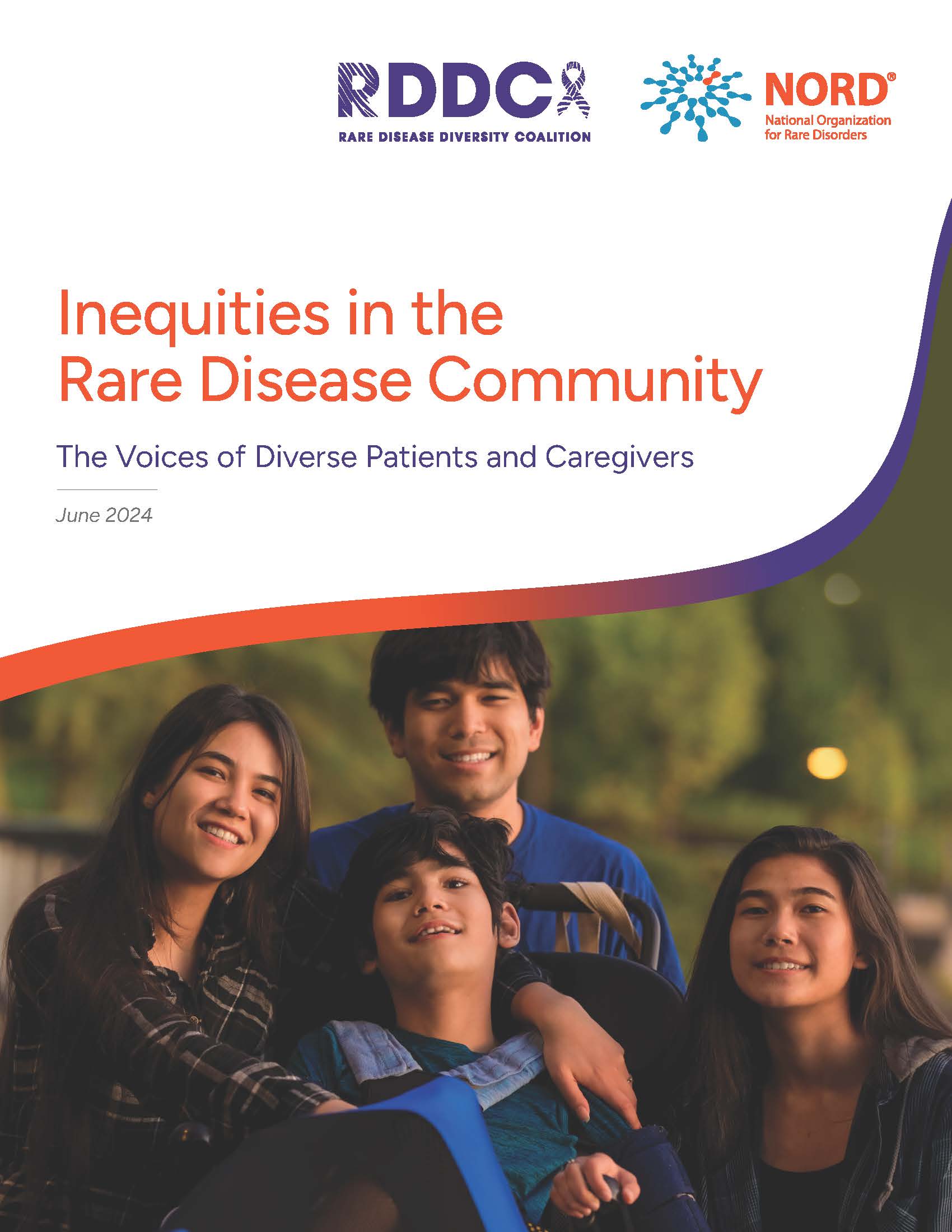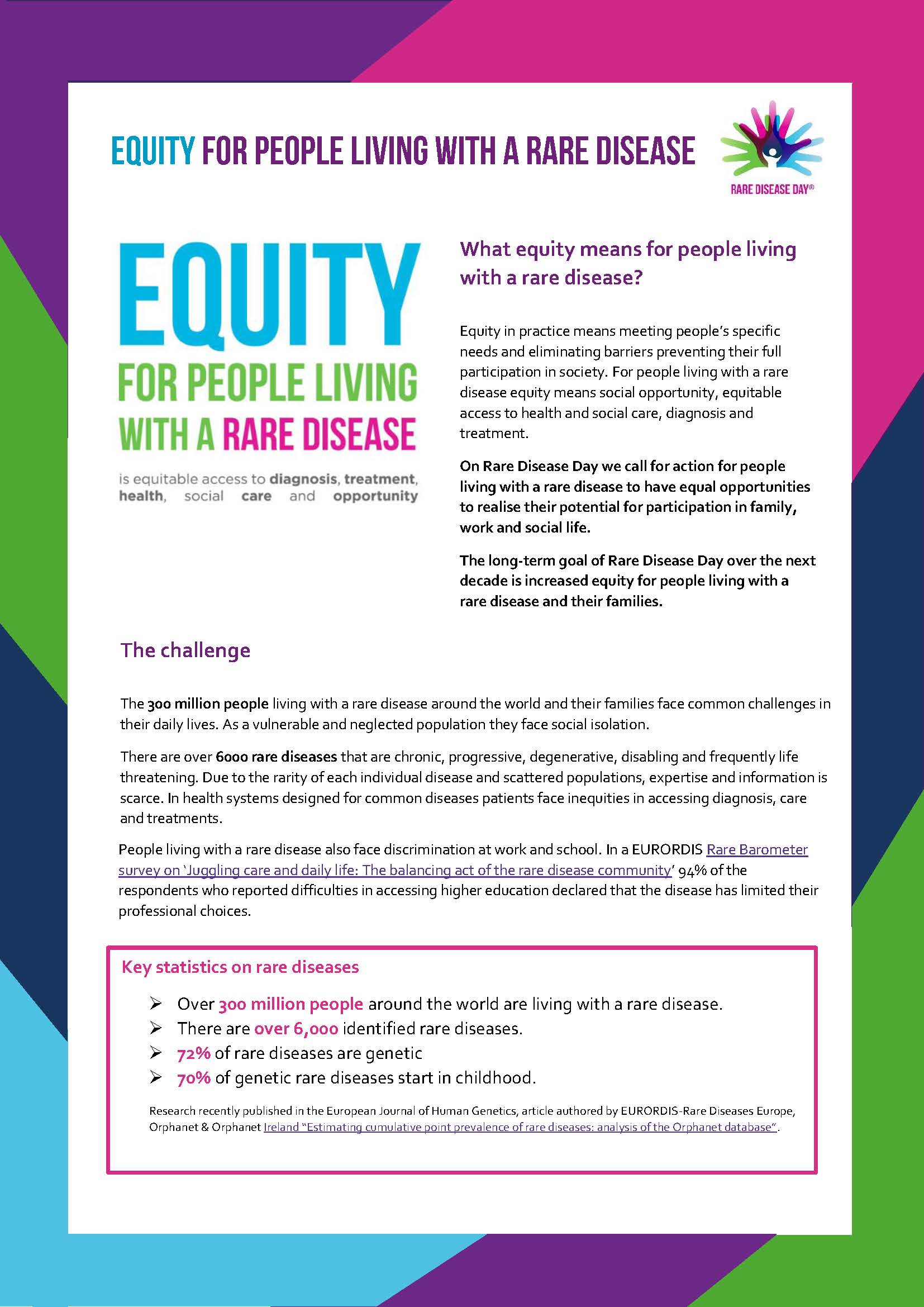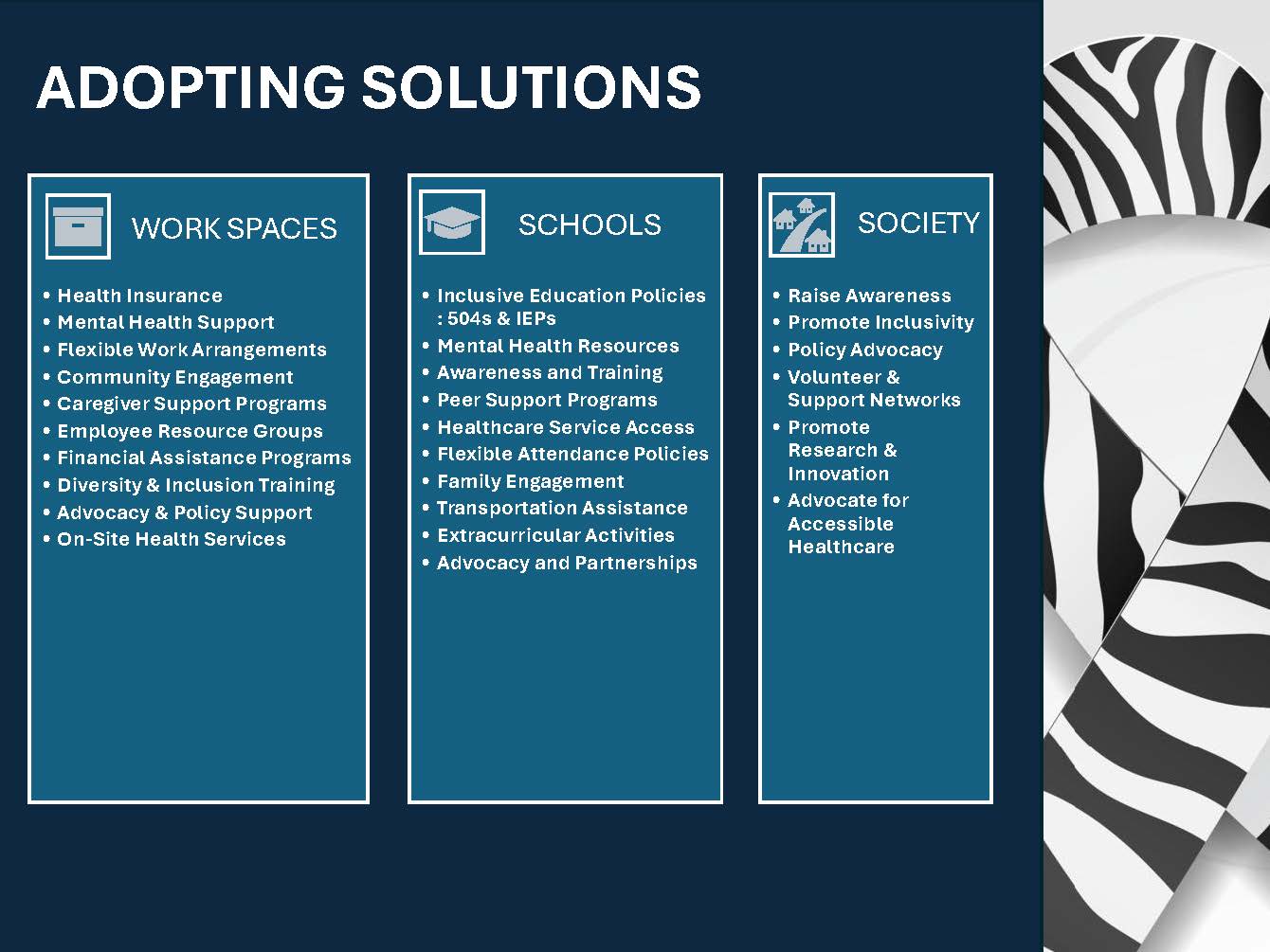Did you know?
- Prevalence: Approximately 30 million Americans are living with a rare disease, which is about 1 in 10 people
- Diverse Demographics: People from all walks of life and regions of the country are affected by rare diseases, with no significant differences among age groups, education levels, or income
- Diagnostic Challenges: Many individuals face a long and difficult journey to receive an accurate diagnosis, often referred to as the “diagnostic odyssey”
- Healthcare Access: Access to specialized care and treatments can be limited, leading some patients to relocate to receive appropriate medical attention
- Financial Burden: The cost of managing a rare disease can be substantial, impacting families financially and emotionally
- Research and Advocacy: The rare disease community has been instrumental in advancing medical research and health policy, including the passage of the Orphan Drug Act in 1983, which incentivizes drug development for rare diseases
- Community Support: Patient advocacy groups and online communities provide crucial support, resources, and information for those affected by rare diseases
- Clinical Trials: Participation in clinical trials is often a key avenue for accessing new treatments, with many patients willing to try investigational drugs
- Technological Advancements: The community has been at the forefront of adopting new technologies, such as telehealth and AI tools, to manage their health conditions
- Awareness and Education: Efforts to raise awareness, such as Rare Disease Day, help to improve understanding and support for individuals living with rare diseases
These facts highlight the resilience and resourcefulness of the rare disease community!
Rare Diseases have been identified
YEARS is the average time it takes to find a diagnosis
people WORLDWIDE have a RARE disorder - that is the population of the United States
%
of RARE disorders are GENETIC
%
of PEDIATRIC disorders are considered RARE
Raising Awareness for Rare Disease Day
Exploring the Challenges & Solutions for the RARE Community

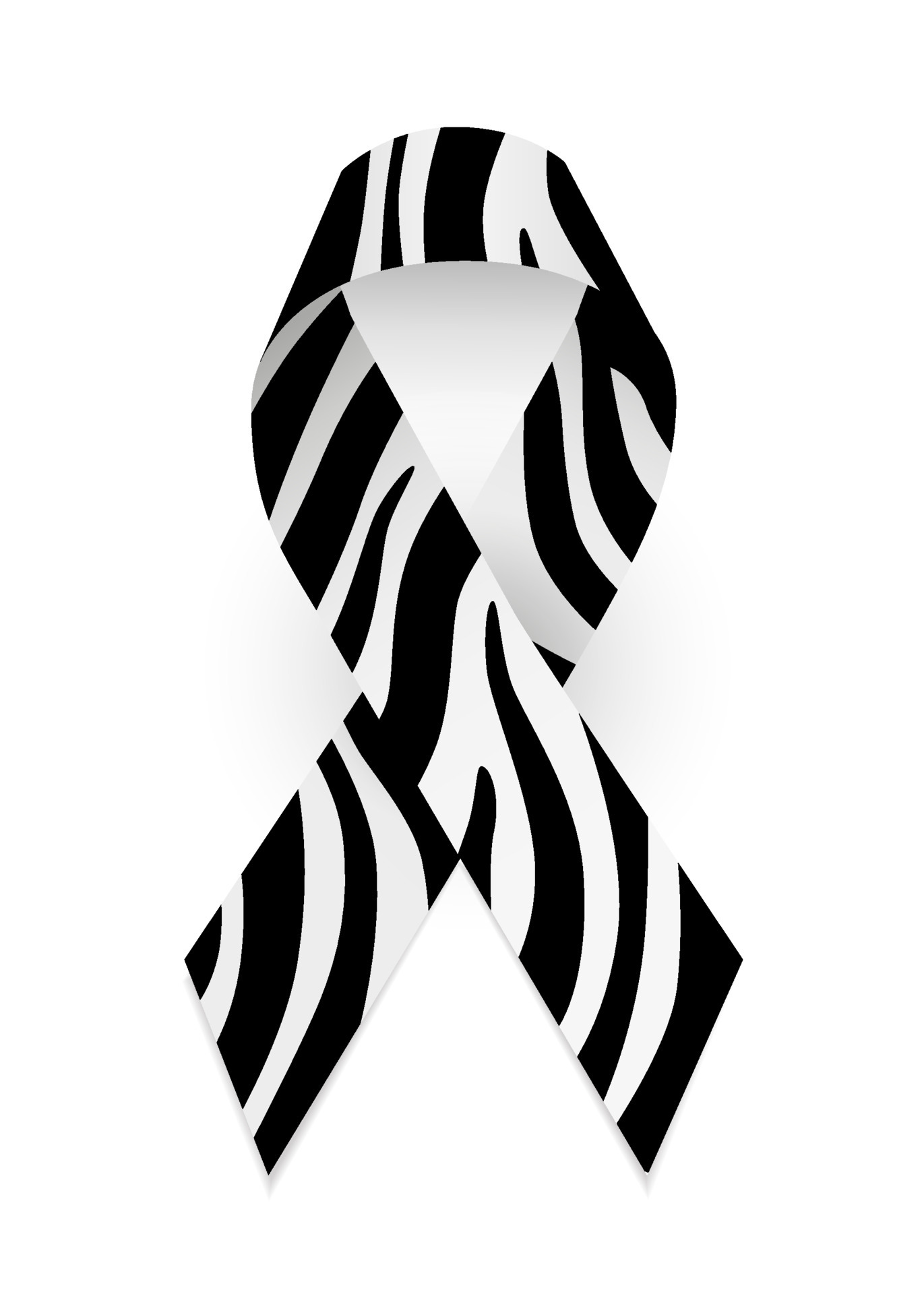
Join our HERD of HOPE
A message from our Founder!
A message from George Washington University students
A message from a few of our youth leaders
#ShowYourStripes – TAF Nation
A special message from our youth leaders: “ASK – Don’t Assume”
#ShowYourStripes – CLEAN AutoWash
The Avalon Foundation moderated a panel discussion with community leaders in Toledo, Ohio addressing the challenges of the RARE community in workspaces, schools, and society. Click the video to listen:
Scroll down to meet our panelists.
LEARN MORE!
There are many resources out there, and we have our favorites. Below are websites and organizations that you can learn from and lean on for additional support & education.
NORD
GLOBAL GENES
ANGEL AID
RARE MAMAS
RARE CONNECT
MAMA TRAUMA BARBIE
RARE DISEASE DAY .ORG
RARE GURU
ASSOCIATION OF CHILD LIFE PROFESSIONALS
Meet Our Esteemed Panel
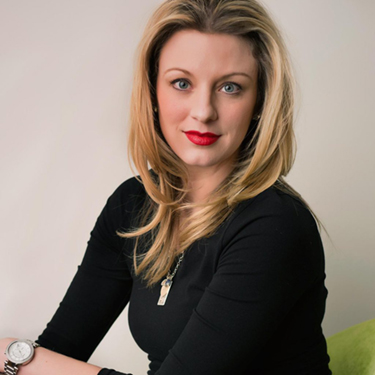
ALICIA WAGNER, HEALTH COACH/FOUNDER OF THE JOSS DISTRICT
Alicia Wagner is dedicated to shedding light on the pressing issues affecting children in America today. As an advocate for family values and wellness, she is passionate about empowering parents, breaking down systemic barriers, and initiating lasting change for future generations.
Drawing on her diverse professional background in pharmaceuticals, the nonprofit sector, and entrepreneurship, Alicia has garnered valuable perspectives on the challenges and opportunities within the healthcare industry. Nevertheless, it was her unexpected role as a stay-at-home mother supporting her child through health difficulties that revealed the harsh realities of our educational, healthcare, political, and workplace systems and their deficiencies in connecting resources and effectiveness. This experience deepened her understanding of the hurdles families face and fueled her passion for reform and the creation of innovative solutions to address chronic and rare health issues.
Obtaining her health coach certification from Epidemic Answers, specializing in Childhood Epidemics, Alicia started a virtual, concierge wellness center, The Joss District, to assist families in their quest towards better testing, treatment and care.
Alicia is also actively working towards her Functional Nutrition Therapy Provider (FTNP) Board Certification. She is determined to revolutionize the traditional healthcare model to offer support to families dealing with complex health issues through an intersectional lens.
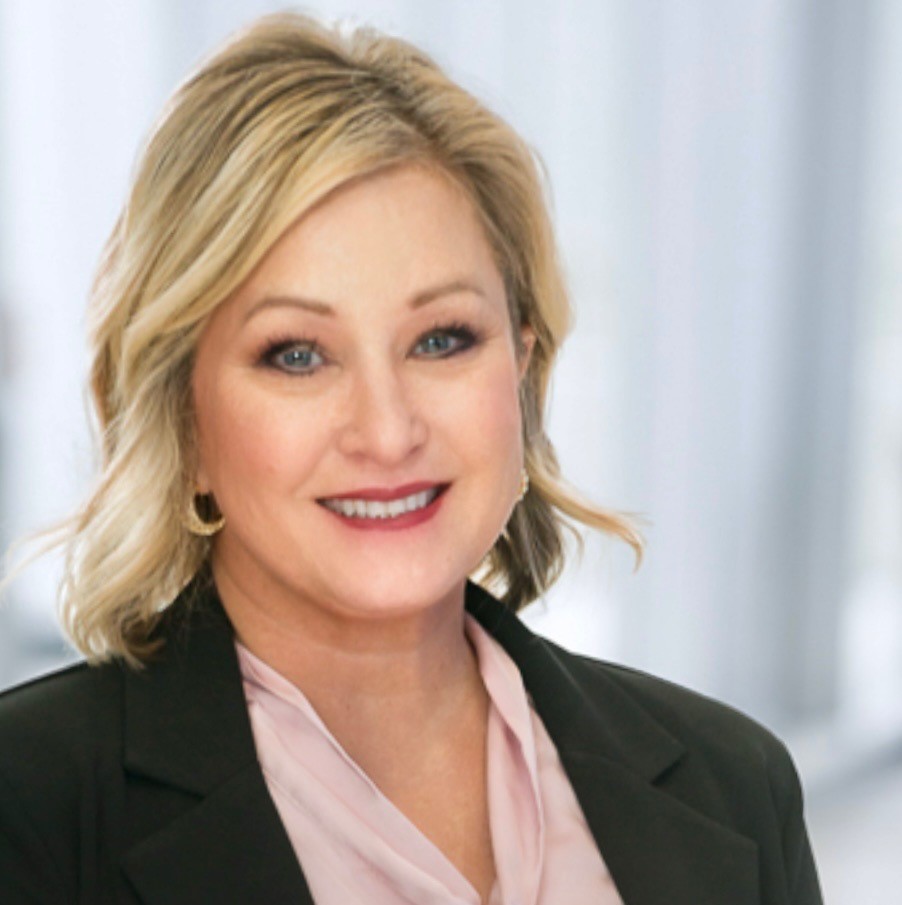
JAMIE HELDT, PRESIDENT OF EMPLOYEE BENEFITS AT HYLANT GROUP (TOLEDO), ADVISOR TO THE AVALON FOUNDATION
Jamie Heldt, prior to joining Hylant, served as the founder of Curated Experience Consulting, Inc.,a healthcare accessibility group dedicated to breaking down barriers to healthcare. In her role as CEO of Curated, Jamie collaborated with various sectors to ensure equal access to affordable healthcare for all. Her strategies ranged from eliminating financial obstacles to streamlining processes for timely care. Previously focused on optimizing relationships between employers and employees, Jamie shifted her focus in 2022 due to a growing realization of the need for immediate healthcare access without financial burdens, achieving her goal to address both physical and mental health challenges caused by financial stress, empowering individuals with cost-free access to essential healthcare resources. Jamie’s commitment to the industry and community health has earned her accolades, including rapid advancement to Senior Vice President at Huntington Insurance, a 2024 Top 100 Innovator of the Year title, national speaking opportunities and her current role as President of Employee Benefits for Hylant, Toledo.
Jamie co-founded and (currently serves as an advisor for) The Avalon Foundation, was named Woman of the Year in 2019 by the Leukemia and Lymphoma Society for her fundraising and advocacy work, is newly appointed to the Executive Committee on the Board of Directors for the St. John’s Jesuit, a member of Ashland University Advisory Council and chairs the Board of Directors for the American Red Cross, Western Lake Erie Chapter.
Jamie holds a Master’s Degree in healthcare administration from Central Michigan University and is licensed in health, life, and property casualty insurances. She enjoys spending time on creative endeavors including flipping homes with her husband, staging Airbnbs, hosting gatherings and traveling. Jamie professes her most important role is a wife to Aaron and mom to five kids.
JAMIE'S ADDITIONAL CONSIDERATIONS FOR RARE HEALTHCARE
What are some considerations that patients or parents of patients with rare diseases need to consider when it comes to selecting health insurance?
- Specialist Networks: Insurance plans may have limited access to specialists who treat rare diseases. Ensure that plans offer adequate access to professionals who are experts in the disease.
- Treatment Availability: Rare disease treatments, especially newer or experimental therapies, may not always be covered by insurance plans. It’s important to assess whether the plan provides coverage for such treatments.
- Out-of-Pocket Costs: Treatments for rare diseases can be extremely expensive, and many insurance plans may not cover these costs in full. Patients and their families may face significant financial burdens.
Insurance Coverage Gaps
- Pre-Existing Conditions: Individuals with rare diseases may face challenges when seeking new health insurance coverage due to pre-existing condition clauses, though these are prohibited under laws like the Affordable Care Act in the U.S. some plans that are offered for group buying as individuals are still medically underwritten and those with rare diseases likely would not qualify.
Coordination of Care
- Multidisciplinary Approach: Rare disease patients often require care from multiple specialists in different fields (neurologists, geneticists, etc.). Health insurance plans may not cover all necessary services under a coordinated care model, or they may require approvals for cross-specialty referrals.
- Case Management: Some health insurance plans offer case managers who can help patients navigate the healthcare system, coordinate treatment plans, and work to ensure coverage for complex, multi-faceted care.
- International Access to Care: For some rare diseases, treatment may be available only in specific countries. Understanding health insurance coverage for international care or travel may be important for patients seeking treatment abroad.
Telemedicine and Remote Care
- Telehealth Services: Patients with rare diseases may have to consult with specialists who are far away. Health insurance that covers telemedicine can provide essential access to care without requiring travel.
- Remote Monitoring: Some rare diseases require ongoing monitoring that can be done remotely. Health insurance policies that support telemonitoring or home health devices can make a big difference for patients.
Why are appropriate Mental Health and Support Services critical to a patient with rare disease?
- Psychosocial Support: Rare diseases often come with emotional and psychological challenges. Coverage for mental health services and support groups can be a crucial part of comprehensive care for patients and their families.
- Caregiver Support: Some rare disease patients require long-term caregiving. Navigating facility selection and care giving burnout are critical for optimal support.
- EAP is critical for travel coordination, mental health support, financial literacy etc.
What extra considerations do rare disease patients face when it comes to the cost of accessing care?
- Drug Coverage: Rare diseases often require specific medications, and health insurance may not cover these drugs or may only cover them under certain conditions. This can lead to high out-of-pocket expenses.
- Assistance Programs: Some pharmaceutical companies offer patient assistance programs to help with medication costs. Health insurance policies that integrate with such programs can provide added financial relief.
- Exclusions for Experimental Treatments: Insurance policies might exclude coverage for experimental treatments or clinical trials, which can be a critical option for patients with rare diseases.
- Out-of-Network Providers: Rare disease specialists may not always be in-network, requiring patients to pay higher out-of-pocket costs or to seek out-of-network care.
- Trial Participation: Clinical trials can be a vital part of treating rare diseases, but many insurance plans do not cover the costs associated with trial participation, including treatments that are not yet FDA-approved.
- Coverage for Trial-Related Services: Patients may need to advocate for coverage of services related to participation in clinical trials, such as travel, diagnostics, and additional consultations.
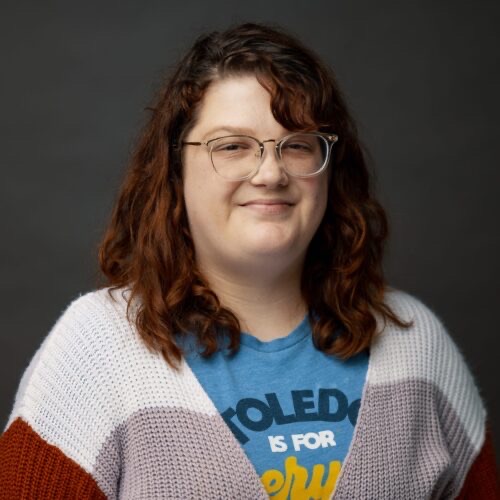
JENNIE GEIMAN, DREAM COODINATOR AT THE ABILITY CENTER
Jennie Geiman has been a lifelong resident of the Greater Toledo area. She revcieved her bachelor’s degree in early childhood education from Lourdes University. After teaching for several years, Jennie earned a master’s in education from Bowling Green State University
With a passion for education and inclusion, Jennie spent eight years as a 3rd grade teacher, dedicating herself to creating engaging and supportive learning environments for students. Her commitment to accessibility and advocacy led her to The Ability Center, where she now serves as the DREAM Coordinator. As a passionate reader since childhood, Jennie uses books and media to educate the community about inclusion for people with disabilities by hosting story times, teacher workshops, book clubs, and more.
Jennie has had an acquired limb difference since the age of 2. In middle school she was diagnosed with a rare genetic bone disorder called Osteopoikilosis. She resides in Maumee, where she enjoys spending time with her family, baking, traveling and reading. She has a happy-go-lucky lab named Cash and a very grumpy cat named Scout.
ADDITIONAL SUPPORT FROM THE ABILITY CENTER FOR WORK PLACES
For businesses interested in learning how to be more equitable and diability-friendly, please contact Jules Patalita at The Ability Center.
419-885-5733 x 120
jpatalita@abiltycenter.org
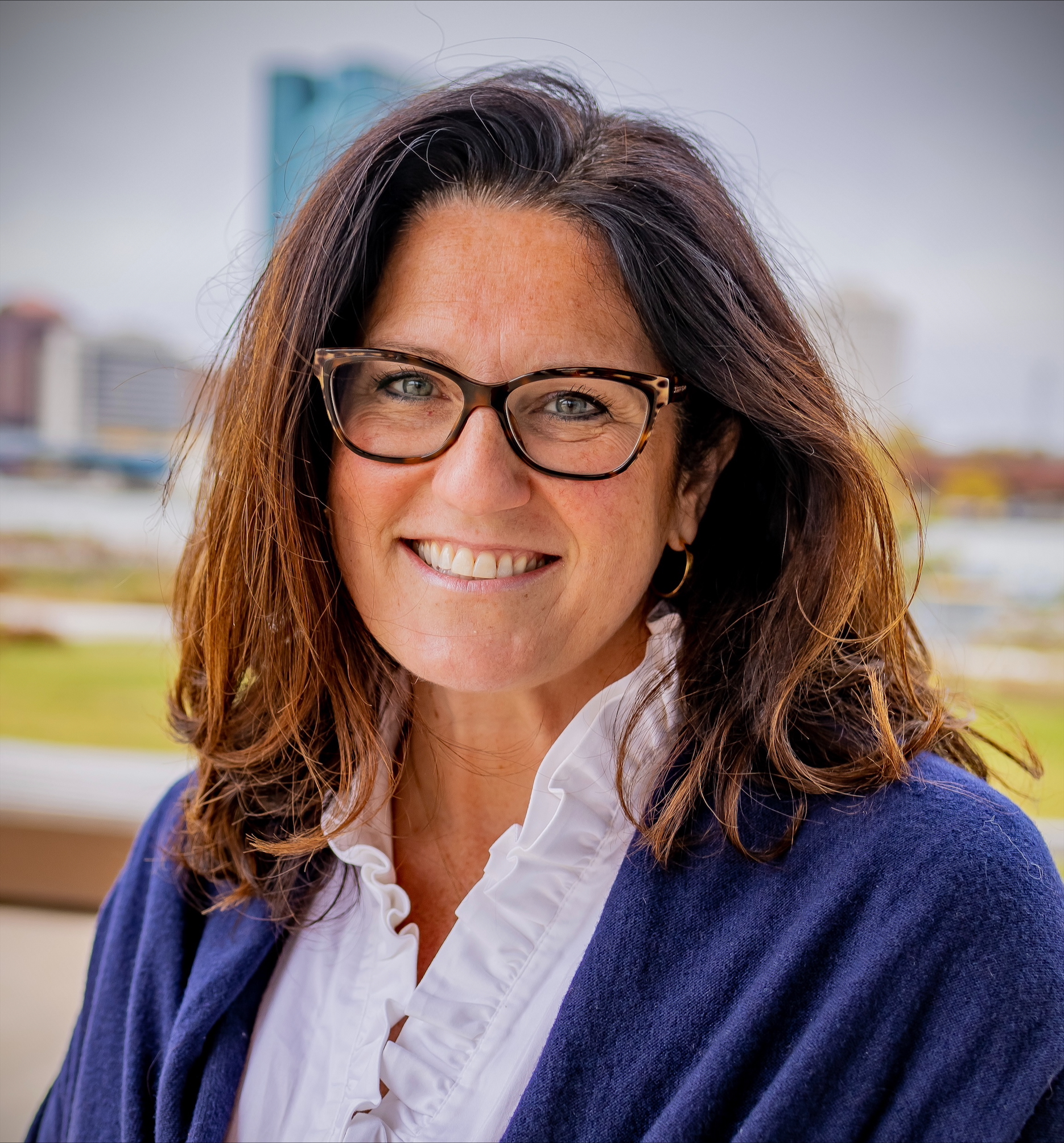
DEBORAH AYRES, PRESIDENT OF THE AVALON FOUNDATION, LIFE COACH, WELLNESS PRACTITIONER
“How we think and feel about the medicines we take into our bodies significantly determines their effectiveness in improving our health, well-being, and quality of life.”
Deborah’s daughter was diagnosed with the rare metabolic bone disorder, Hypophosphatasia as a toddler. After 10 years of vigilantly advocating for her daughter’s health and wellness, she helped her overcome intense psychological, emotional, and physical challenges while beginning a painful injection treatment in 2016. Deb and Avie co-founded The Avalon Foundation several months later. Their mission is to help other pediatric RARE families successfully begin treatment without all the obstacles. Deborah and Avalon, with the help of other medical professionals and a team of kids that care, created the #PainBox Program. Enrolled families receive customized support kits, prepared by volunteer kids, that offer psycho-emotional support and encourage compliance and total wellness for the whole family. Their vision is to use this program with critical treatments for other rare diseases as well.
Professionally, Deborah has been a Wellness Practitioner for over 25 years. She is studied, certified, and licensed in over a dozen different types of healing body work and energy work. Uniquely combining her studies of the healing arts, Native American medicine, psychology, counseling, and mindfulness, Deb shares her expertise and experience to help the patient families of The Avalon Foundation. As an advocate and healer, her mission is not only to help individuals, but to also provide opportunities to society to raise awareness and build bridges of understanding and compassion toward the rare disease community and humanity as a whole.
Join Our Mission
At The Avalon Foundation, we believe in the power of youth to drive change. Join us in our mission to support young leaders who are making a difference in the pediatric rare disease community. Your involvement can help us expand our programs and reach more children in need. Together, we can build a brighter future where kids care for kids.
